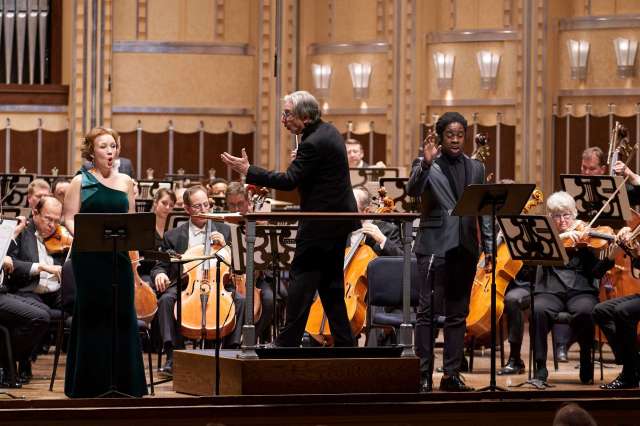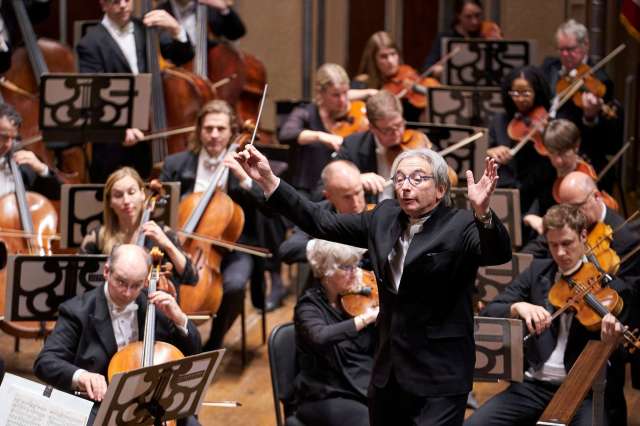Cleveland Orchestra
Michael Tilson Thomas, conductor
Sasha Cooke, mezzo-soprano
Dashon Burton, bass
Severance Hall
Cleveland, OH
February 20, 2020
Tilson Thomas: Meditations on Rilke
Berlioz: Symphonie fantastique, Op. 14
Now in his twenty-fifth and final season as music director of the San Francisco Symphony, Michael Tilson Thomas has increasingly devoted his time to composition, following in the footsteps of the composer-conductor luminaries with whom he closely worked – Stravinsky, Copland, and Bernstein amongst them. His freshly-minted song cycle Meditations on Rilke was given its second set of performances last weekend, following the San Francisco world premiere in January. It’s a work, however, which has been gestating in the back of Tilson Thomas’ mind for some time: in a recent interview, he referred to it as a “pages of [his] musical diary.” Structurally, the piece immediately brings to mind Mahler’s Das Lied von der Erde in its scoring for large orchestra with mezzo-soprano and bass soloists alternating between the six Rilke poems. While not on as large a scale as the Mahler, it’s still quite substantial, clocking in at just under forty minutes – the program was originally slated to open with Berlioz’s Roman Carnival Overture, a quantity which was excised when the MTT work burgeoned to its current dimensions.

A deliberately out-of-tune, honky-tonk sounding upright piano had the first word in the opening “Herbsttag,” setting the scene in a small-town dive bar where the pianist introduces influences from the classical repertoire in addition to the standard pub fare, setting in motion the present set of stream-of-consciousness reflections. The texture grew from the solo piano to an orchestral landscape of colorful effects, remaining resolutely tonal and approachable. Dashon Burton offered a deep and powerful tone, yet was often touchingly pensive, and the spirit of Mahler was never far away – hardly a surprise in a work from such a distinguished Mahlerian as MTT. “Ich lebe mein Leben” was given a lushly gorgeous setting, sweetly sung by Sasha Cooke, and an oboe passage from Frank Rosenwein served as a further highlight. “Das Lied des Trinkers” again brought to mind Das Lied von der Erde in its apparent affinity for drinking songs. A rather more rambunctious counterpart to the preceding song, matters began plaintively but soon crested to the thorny and dissonant.
“Immer wieder” featured a glowing brass chorale, and as elsewhere, extensive paragraphs for orchestra alone. Cooke had a natural feel for MTT’s language in this gem of the cycle, which the composer colorfully likened to a “Schubert cowboy song” – Morricone came to my mind as well. The crack of a whip epitomized the vigor given to “Imaginärer Lebenslauf” which called upon both singers, often quite ingeniously blended. The concluding “Herbst” opened with a long flute solo very finely given by Joshua Smith. The harp and pizzicato strings gave matters an ineffably autumnal quality, and the cycle closed with Burton’s repeated incantation of “fallen”, serving a similar function as “ewig” in the work’s Maherlian predecessor.
MTT has a long history of not only conducting the Berlioz Symphonie fantastique, but conducting it in Cleveland, having first performed it with this orchestra in 1977. It made for a choice pairing with the Rilke songs with both works deeply autobiographical and evidencing their respective conductors’ acute ear for orchestral color. The dreamy “Rêveries” that opened was meditative yet never shying away from building to hypnotic passions. The first presentation of the ubiquitous idée fixe was refined, hardly hinting at the grotesque mutations to come, and the pious solemnity of the coda was another highpoint of this first movement. “Un bal” began as lilting waltz, emanating a Gallic elegance, only to dissolve in making way for the idée fixe. There was sharp clarity even given the sprawling orchestra, paying dividends in the blazing conclusion.
The “Scène aux champs” was given with ample breathing room, a capacious portrait of the quietude of the countryside. The dialogue between English horn Robert Walters and offstage oboe Jeffrey Rathbun was expertly articulated – and at the long movement’s end, Walters was answered not by Rathbun, but by the rumbling timpani, signaling the impending storm. “Marche au supplice” was tautly concentrated, erupting with brilliant brass anchored by a backbone of bassoons (four of them, no less). Daniel McKelway’s shrill interjections on the E-flat clarinet made for arresting effect in the closing “Songe d’une nuit du sabbat”, perhaps only outdone by the tolling cathedral bells and goosebumps-inducing low brass.

